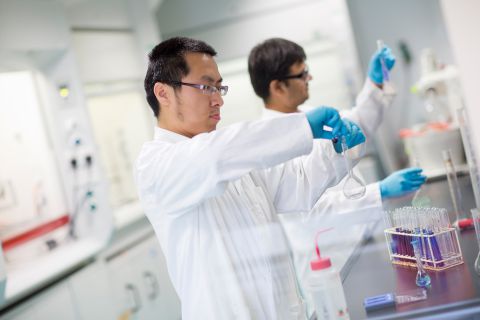Browse the full Impact Rankings 2020 results
Higher education institutions across the world that are leading on healthcare and measures of well-being have described how they have been “catapulted into the limelight” as Covid-19 draws attention to the impact of universities.
These institutions are also now being celebrated in Times Higher Education’s Impact Rankings 2020, based on the United Nations’ Sustainable Development Goals (SDGs).
A diverse range of institutions from Europe, Australasia, Asia and North America lead the THE Impact Rankings table on good health and well-being (SDG 3), with RCSI University of Medicine and Health Sciences taking the number one spot.
Metrics include institutions’ research on key diseases and conditions, the proportion of their health graduates, their outreach programmes related to health and their health services for students and staff.
Although the data were gathered before the coronavirus crisis, they reveal the universities that are likely to be at the forefront of the healthcare response to the pandemic.
Meanwhile, some of the metrics included in the other SDG tables, such as student food security, use of secure employee contracts and the promotion of remote working, provide a sense of how institutions may be performing in terms of responding to the social impact of the virus.
For example, just under a third of the 290 institutions ranked in the table on zero hunger (SDG 2) received top marks on a measure asking for evidence of a programme on student food insecurity, while less than 10 per cent of the 479 institutions ranked for decent work and economic growth (SDG 8) received top marks for the proportion of employees on secure contracts.
Pam Benoit, senior vice-president of academic affairs and provost at the University of Alabama at Birmingham (UAB), which ranks seventh in the table on good health and well-being, said that the pandemic has drawn attention to the work that universities do for their local communities and society more broadly.
“It’s made it very apparent that there are incredible experts in universities that can help us figure out what the right steps are to try to address the issues [we face],” she said.
“We have an incredible infectious disease department in the School of Medicine and they have been on the leading front of national press around Covid-19 [talking about] various clinical trials that are going on at this university and the attempt to develop a vaccine. That has catapulted UAB into the limelight and really shown how important the work is that’s coming out of the various health disciplines.”
She added that Covid-19 was likely to have “an interesting impact on what students decide to major in” at university.
“Students of this generation are very interested in being able to make a difference, and it’s pretty clear when you see healthcare workers putting their lives on the line that they are making a huge difference for the community. I think people will recognise that and see that as an attractive thing that they would be interested in doing themselves,” she said.
Cathal Kelly, CEO and registrar at RCSI, added that the virus has “brought a very welcome focus back on the importance of STEM and the importance of universities and the view of experts to influence policy”.
“The role of the university sector, particularly in the health sciences, has never become more relevant and more important,” he said.
Professor Kelly credited RCSI’s leading performance in the ranking to a “combination” of factors.
“We’re independent and not-for-profit, which means we can act quickly and we’re responsible for our own future. The fact that we only do health science and we’re led by clinicians and researchers means that there’s tremendous focus on that. We’re very international. And finally, we’re a combination of a postgraduate training body and a medical university, which means we provide a unique continuum from undergraduate [level] all the way through [one’s] professional lifetime in many key healthcare areas,” he said.
Cathal Kelly on the THE Impact Rankings 2020
Imran Khan, head of public engagement at the Wellcome Trust, said that the high demand for public engagement in science was an “important opportunity” but one that was difficult for institutions to navigate.
“Ironically, when Covid-19 is all anyone is talking about, it becomes really hard for any individual researcher to cut through and engage effectively with key ideas or information. On top of that, the issues change and move so quickly, so figuring out how to respond to public demand is hard,” he said.
“One thing we have to do is remember that this is a global pandemic, which will probably affect the world’s most vulnerable the most. We need to find ways to engage in order to highlight and serve their needs.”
Top universities for good health and well-being (SDG 3)
| Good health and well-being (SDG 3) rank | Institution | Country/region | Good health and well-being (SDG 3) score |
| 1 | RCSI University of Medicine and Health Sciences | Republic of Ireland | 90.8 |
| 2 | La Trobe University | Australia | 90.6 |
| 3 | China Medical University, Taiwan | Taiwan | 89.8 |
| 4 | University of Auckland | New Zealand | 89.1 |
| 5 | University of Otago | New Zealand | 88.8 |
| 6 | McMaster University | Canada | 87.9 |
| 7 | University of Alabama at Birmingham | United States | 87.8 |
| 8 | Australian Catholic University | Australia | 87.7 |
| 9 | University of Dundee | United Kingdom | 87.6 |
| 10 | Chang Gung University | Taiwan | 87.3 |
Register to continue
Why register?
- Registration is free and only takes a moment
- Once registered, you can read 3 articles a month
- Sign up for our newsletter
Subscribe
Or subscribe for unlimited access to:
- Unlimited access to news, views, insights & reviews
- Digital editions
- Digital access to THE’s university and college rankings analysis
Already registered or a current subscriber?











